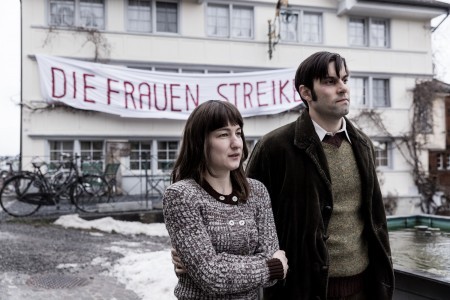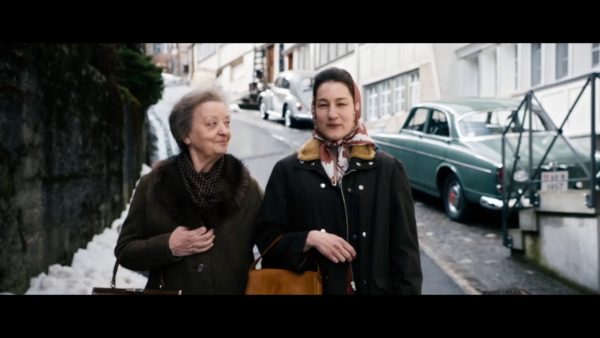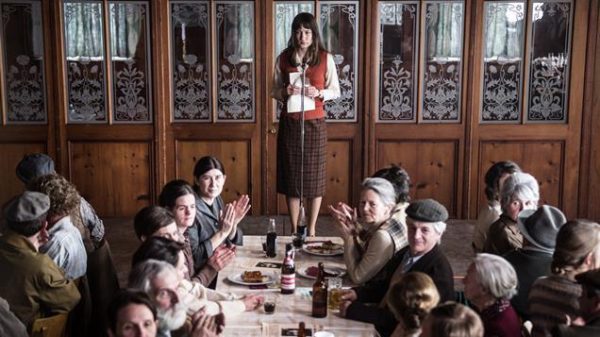Women in Switzerland did not win the right to vote in federal elections until a 1971 referendum finally settled the issue. Petra Volpe’s exceptionally fine feature film, The Divine Order, which opens in Canada on November 3, examines this socially-charged topic through the eyes of several courageous women in a remote Swiss village in the foothills of the Alps.
The world is changing, but in this particular burg, time has stood stultifyingly still. Women like Nora (Marie Leuenberger), a mother of two boys, is satisfied with her lot as a humble housewife. Imbued with traditional values, she hews to the conformist status quo. When her grouchy father-in-law asks for a cup of tea, she springs into action like a seasoned maid. Nora knows her place in society.

Emboldened by an upcoming national referendum on women’s rights, Nora informs her husband, Hans (Max Simonischek), of her intention to seek a part-time job. She’s bored with her household tasks and hopes to spread her wings. Hans, a blue-collar worker, objects. His view is underpinned by the assumption that a women’s place is at home.
The conservative values in the village manifest themselves yet again when Hanna (Ella Rumpf), the rebellious daughter of Nora’s sister, is detained by police. Her offence? Contrary to her parents’ wishes, she has absconded to Zurich with her long-haired boyfriend. It’s clear that young women like Hanna have few rights.
As for Nora, she has no desire to be “liberated,” even after an earnest women’s lib representative hands her a stack of brochures to read. Older women in the village, such as her husband’s employer, have no time for such nonsense. Women’s emancipation is a curse and in contravention of the “divine order,” she declares in no uncertain terms.

Nora, having been swayed by the brochures, asserts her independence by refusing to contribute to a local fund opposed to universal suffrage. Impressed by Nora’s convictions and courage, Vroni (Sibylle Brunner), an old campaigner for women’s rights, joins Nora’s crusade for gender equality. So does Graziella (Marta Zoffoli), a divorced Italian woman and the proprietor of a pub. Graziella, a high-spirited person, persuades Nora to get her hair styled and buy new clothes.
Her self-confidence having risen, Nora applies for a job at a travel agency and asks her sons to clean up after themselves following meals.
Nora is flying high, but attitudes in the village have yet to change. “Women must remain quiet in society,” says a man who passes her on a street. “Go home to your children,” shouts another indignant man. Werner, her brother-in-law, is cut from the same cloth. Having seen Nora’s women lib posters plastered around the village, he’s upset. At school, meanwhile, Nora’s sons are teased by fellow students.
Buoyed by their new-found beliefs, Nora and a few other women travel to Zurich to watch a suffragette demonstration. Caught up in the excitement, they attend a new-age seminar on sexuality presented by a bold Swedish woman.

Hans, back from reserve duty in the army, is shocked to see Nora at a village forum speaking in support of the referendum. By now, Nora has become an unabashed suffragette leader. In short order, she and her friends go on strike, leaving household chores to their husbands and children.
Predictably enough, Nora’s transformation causes fresh tensions with Hans. But eventually, he adjusts to the new norms.
The Divine Order, expertly directed by Volpe and buttressed by an excellent cast led by Leuenberger, distills the essence of this hopeful mood.